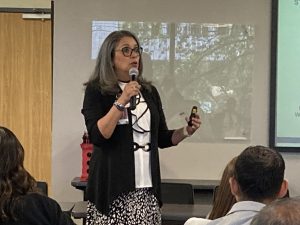
About 55 educators from around the state turned out for a TEA Learning Lab Wednesday at Ector County ISD.
Participants from Regions 14, 15, 16, 17 and 18 visited classrooms at Dowling Elementary and Odessa High School to observe classrooms and a Professional Learning Community meeting with teachers.
Jaime Miller, now executive director of Talent Development, formerly executive director of curriculum and instruction, and Lilia Nanez, associate superintendent of curriculum and instruction, reviewed district improvements made since 2019. As of 2022, ECISD is a B district, having risen from a B in 2018-19. Because of the coronavirus pandemic, the state waived ratings for 2020-21.

“We are an 85. It was amazing. A lot of work went into building a failing district to becoming an 85. … We went from 33% of our kindergarteners being ready to 57%,” Miller said. “Our goal was 60 and we just barely missed it. We had the opportunity to change the goal from 60, to lower it because of COVID and we were like no; we’re hitting it.”
Miller said an entire department focused on prekindergarten.
“Look at what we did. Some of the big things you’re going to see is a number of schools earning an A doubled” and the number of B rated schools went from six to 12, Miller said.
Josh Parker with Education First spoke to the group virtually at the ECISD administration building. TEA partnered ECISD with Education First through a grant. Miller meets with TEA and the RSSP about once a month.
Nanez said the districts that convened Wednesday are part of the Resilient School Support System that the Texas Education Agency has been funding.
Executive Director of Curriculum and Instruction Lisa Wills said at the elementary they were very interested in the Opportunity Culture and how that works. Dowling Principal Julie Marshall talked to them a lot about how she did that and how they fund it and how teachers work teaching and coaching into their day.
Darolene Willis, a math teacher at Olfen ISD visited Dowling.
She added that it is something they could implement at Olfen, but it will look different because their district is really small.
“I thought it was really neat. They had a lot of really cool things going on in the classrooms. The teachers seemed to really have the kids engaged and the kids were enjoying what they were learning,” Willis said.
Dwenette Stevenson, director of curriculum and instruction at Morton ISD, said they are part of the learning lab process already.
“It’s a great way to be able to see ways that other schools have implemented it. And I’ll be honest that the most effective thing for me is just the face-to-face meeting we have been meeting for in my position for the last 18 months just via zoom and it’s great to connect in person, finally, after COVID. … That’s … my huge takeaway today is just to be able to collaborate together. But absolutely of everything that TEA has put out in retrospect to RSSP has been very useful for growth in our districts,” Stevenson said.
Rebecca Bunger, curriculum director at Rankin ISD, loved going into the elementary classrooms to see the different research-based strategies that teachers were using.
“They’re using different high-quality instructional material than we are. But the strategies they’re using are phenomenal and I liked that we went to a low-performing school, and we could still see that really good teaching going on and those master teachers doing such a fantastic job in those classrooms. That was my favorite part of it,” Bunger said.



